Reasons Why You Need Professional Block Paving
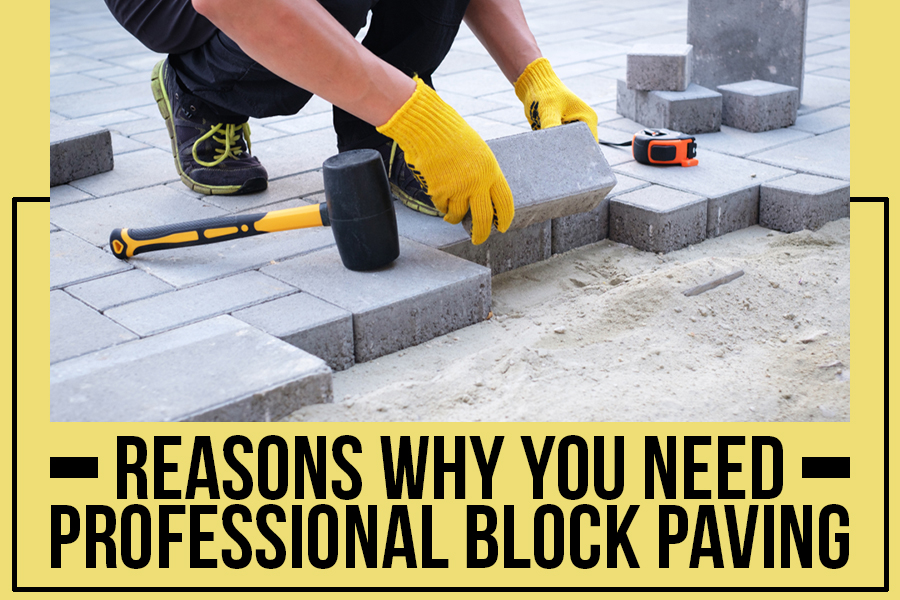
Key Takeaways:
- Block paving is done using individual paving blocks, typically concrete, that are arranged in various patterns to form a hard surface.
- Block paving is made from strong, long-lasting materials that withstand the elements and heavy foot traffic, making it an ideal choice for outdoor spaces.
- Block paving is available in many colors, shapes, and patterns, making it a versatile choice for outdoor spaces.
- Unlike other outdoor surfaces such as concrete or asphalt, block paving comprises individual blocks that are easy to replace if damaged or worn.
A garden is a kaleidoscope of color, texture, and fragrances. It’s an outdoor oasis where you can bask in the sun or take refuge beneath an old oak tree with a book. The perfect backdrop to such moments of relaxation are pathways made with block paving. A sturdy, reliable material that provides beauty and functionality to your outdoor space. Professional block paving will enhance your garden’s aesthetic and is designed to withstand years of wear and tear and ensure smooth transitions between all areas of your property.
In this blog post, pavement experts from Purcell’s Paving and Masonry will discuss the benefits of block paving and why you should consider it for your driveway or garden pathway.
What is Block Paving?
Block paving is used to construct driveways, patios, and sidewalks. It comprises individual paving blocks, typically concrete, that are arranged in various patterns to form a hard surface. The blocks come in multiple shapes and sizes, allowing for a wide range of design options. Block paving is a popular choice for outdoor paving because of its durability, low maintenance requirements, and attractive appearance.
Why Invest in Professional Block Paving?
Block paving has many benefits, making it perfect for your outdoor spaces. Here are some reasons to learn why you should invest in block paving.
1. Durability
One of the critical benefits of block paving is its durability. Block paving uses solid and long-lasting materials that withstand the elements and heavy foot traffic, making it an ideal choice for outdoor spaces. With proper installation and maintenance, block paving can last many years, providing a long-lasting solution for homeowners.
2. Aesthetics
Another essential benefit of block paving is its aesthetic appeal. It is available in many colors, shapes, and patterns, making it a versatile choice for outdoor spaces. With its attractive appearance, block paving can enhance the visual appeal of any property, making it an ideal choice for driveways, patios, and sidewalks.
A pavement expert will take the necessary steps to ensure that the blocks are laid in a neat and attractive pattern. They will also help you choose a jointing compound that matches the color of the blocks to provide a seamless surface.
3. Functionality
Block paving provides a hard, flat surface ideal for outdoor spaces such as driveways, patios, and sidewalks. The flat surface makes it easy to walk on and navigate, providing a functional solution for homeowners.
Whether you create a functional driveway, a spacious patio, or a safe sidewalk, block paving can provide various options to suit your needs.
4. Increased Property Value
Investing in block paving can also positively impact the value of your property. A well-maintained block paving installation can enhance the overall appearance of a property, making it more attractive to potential buyers. The durability, functionality, and aesthetic appeal of block paving can contribute to increased property value.
As discussed above, block paving is a low-maintenance option that can help reduce the time and money spent on maintenance over the years. It can be especially important for property owners looking to increase their property’s value over time.
Also Read: Belgian Blocks – A Speedy History for The Eager Driveway Paver
5. Low Maintenance
One of the most significant advantages of block paving is its low-maintenance requirements. Unlike other outdoor surfaces such as concrete or asphalt, block paving comprises individual blocks that are easy to replace if damaged or worn. Maintenance can be performed on a smaller scale, reducing the time and money spent on maintenance over the years.
Block paving is resistant to staining, fading, and cracking, making it a durable option that can withstand heavy use and the elements.
6. Safety
Block paving provides a hard, flat surface ideal for outdoor spaces such as driveways, patios, and sidewalks. The flat surface makes it easy to walk on and navigate, reducing the risk of tripping or slipping, especially for older adults and children. It can be designed with various textures and finishes to provide additional traction and stability, making it a safe option for outdoor spaces.
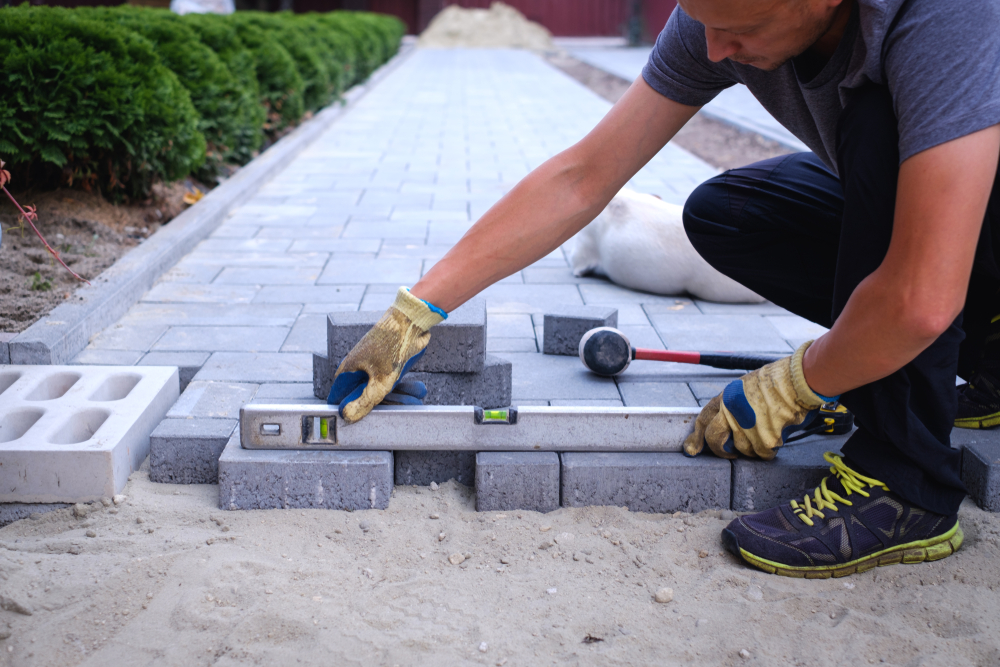
Block Paving Maintenance Tips
It is crucial to perform regular maintenance to keep it looking its best and to ensure that block paving lasts for many years. Here are some tips for maintaining block paving:
Clean the Surface: Remove dirt, grime, and debris regularly using a pressure washer or garden hose. You can also use a mild soap solution but rinse thoroughly to prevent residue buildup.
Seal the Surface: Sealing the surface of block paving helps protect it from weather and environmental elements and extends its lifespan. Consult a professional for recommendations on the best type of sealant and how often it should be reapplied.
Repair any Damage: Quickly address any damage or wear to prevent further damage from occurring. A professional can repair or replace individual blocks as needed to restore the overall appearance of the surface.
Check for Settlement: Check for settling or sinking of blocks, especially after heavy rain or snow, and have a professional repair as needed.
Choose Purcell’s Paving and Masonry for Your Block Paving Needs!
Looking for paving services in Berkeley Heights, NJ? We can help. At Purcell’s Paving and Masonry, we understand the importance of a well-designed and properly installed block paving surface. Our experienced team of pavement contractors is licensed and insured. It has the expertise to provide you with the highest quality block paving services. Whether you are looking to install a new driveway, patio, or sidewalk, or if you need to repair or replace existing block paving, we have the solution for you. Our services include seal coating, crack filling, pothole repair, and other asphalt services.
Why Was Your Driveway Damaged During The Summer?
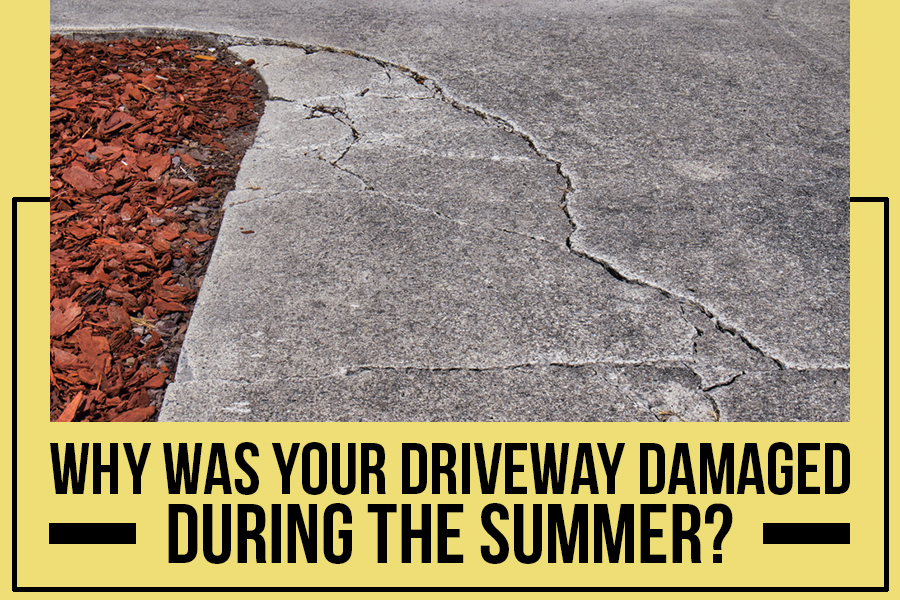
Key Takeaways:
- Summer can damage the asphalt driveway due to sun exposure, rain, lack of maintenance, heat, asphalt mixture inadequacies, and poor drainage.
- Sun exposure leads to the breakdown of the binding agent inside the asphalt, causing cracks and deterioration.
- Constant rain exposure weakens the pavement and can cause buckling and cracking. Fall maintenance is crucial to avoid further damage during cooler temperatures.
- Improper asphalt mixture can become too hot and brittle in hot weather, leading to cracks and potholes.
- Poor drainage can cause erosion and crack or crumbling of the pavement’s surface.
- Cost-effective solutions include asphalt patching, crack filling, and resurfacing.
- Regular maintenance tips include inspecting the driveway, cleaning it, sealcoating every three years, and avoiding spills.
- Seal coating is necessary for protecting the driveway, and a good maintenance plan is necessary regardless of driveway size.
- Asphalt repairs are cost-effective compared to replacing the entire driveway. Hiring a professional contractor is recommended for the best protection.
Your driveway is more than just a path that leads you from the street to your front door. It’s the first thing guests see when they arrive. It’s the first impression of your home and sets the tone for the entire property. But after a long, hot summer, it’s not uncommon to find your asphalt driveway looking worse for wear. The relentless sun, rain, and heat can cause cracks, potholes, and fading. But why are some driveways more affected by the summer than others?
Purcell’s Paving and Masonry will explore why your asphalt driveway is damaged by the summer and what you can do to protect it. This information is crucial for keeping your driveway in good condition and ensuring that your property looks its best. So, please sit back, relax, and let’s dive into the world of driveways and summers!
Reasons for Asphalt Driveway Summer Damage
1. Sun Exposure
Driveways, although proved to be a valuable outdoor asset, the constant sun exposure can wear away your pavement surface. The sun’s rays carry UV radiation that warms up the surface of driveways and breakdown the binding agent inside the asphalt. As a result, the material’s tensile strength begins to deteriorate over time from years of excessive exposure, which leads to cracking and further damage.
2. Rain
Are you a New Jersey resident? If so, you know that June is the rainiest month of the year. That being said, showers are frequent from March to August as well. Although rain isn’t the problem, constant water exposure is disastrous for your driveway.
The moisture from the rain seeps into the pavement and makes it weak, thus causing buckling and cracking over time. Additionally, the waterworks down to the base of the driveway can cause significant shifts in your foundation, leading to further damage.
3. Lack of Fall Maintenance
While summer is your driveway’s busiest season, fall brings its own set of challenges. When cooler temperatures arrive, asphalt driveways are far more prone to cracking due to the changing temperature.
Unfortunately, many people fail to maintain their driveways during this time of year, allowing the damage to continue unchecked until the following spring. To avoid costly repairs in the future, you must take care of your pavement before winter arrives.
4. Asphalt Mixture Inadequacies
Another common issue that leads to driveway damage over the summer is improper asphalt mixture. Asphalt mixtures can become too hot and brittle during hot weather, leading to cracks and potholes.
To create a strong pavement layer, you must use an asphalt mix suited to your area’s temperature range. A professional asphalt contractor can recommend a mix that won’t easily crack in the summer heat.
5. Poor Drainage
Finally, poor drainage can also damage the driveway during the summer months. Suppose water isn’t drained away from your driveway quickly enough. In that case, it can cause erosion—resulting in cracking or crumbling of the pavement’s surface.
The Solutions
Now that we know the causes of driveway damage in the summer let’s discuss some cost-effective solutions.
1. Asphalt Patching
Asphalt patching is one of the most cost-effective ways to repair driveways. By filling in the cracks and holes in the driveway, water won’t be able to seep under the surface and cause further damage.
2. Crack Filling
The best way to prevent further water damage is by filling in larger cracks before they become bigger.
3. Resurfacing
Resurfacing your asphalt driveway can also help prevent future damage caused by extreme temperatures during the hot summer months.
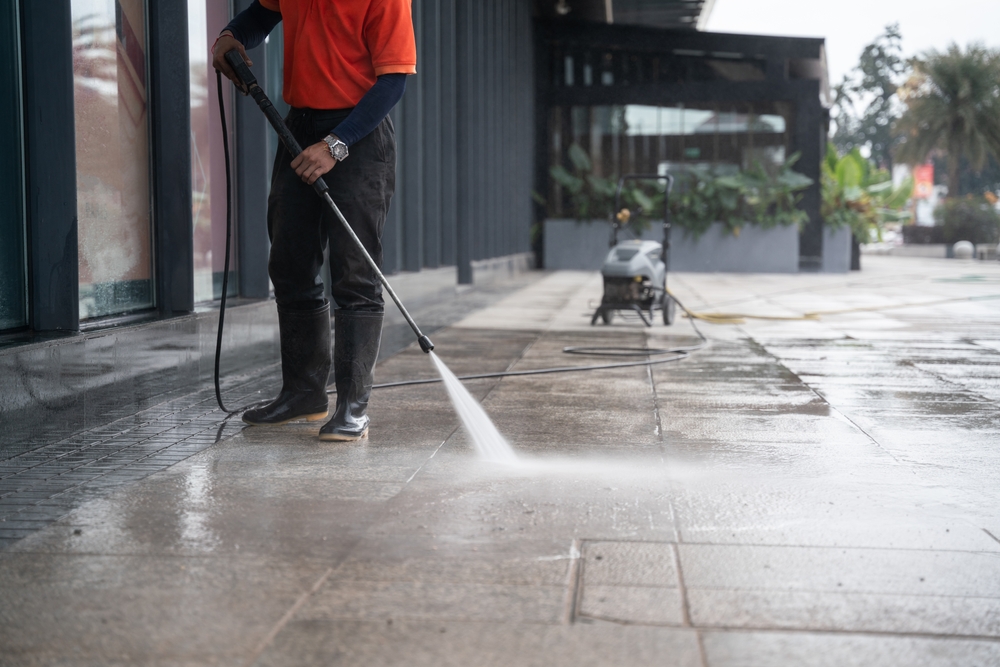
Regular Maintenance Tips
To make sure your driveway stands strong through the summer heat, here are some regular maintenance tips:
1. Inspect for Damage Regularly
Check your driveway regularly for any signs of damage, such as cracks or potholes. If you find any, address them immediately before they become more significant and costly.
2. Clean Frequently
Regularly clean your driveway with a power washer during summer to remove dirt and debris that could cause damage over time.
3. Sealcoat After Two to Three Years
Seal coating your driveway is integral to asphalt care. It should be done every two to three years to keep water from penetrating the surface and causing further damage.
4. Avoid Spills
Be mindful of spills, and avoid letting them sit on your driveway for long periods, as they can cause irreversible damage.
Common Misconceptions about Driveway Maintenance
1. Seal Coating Is Not Necessary
Seal coating is essential for protecting your driveway from damage and should be done every three years.
2. Asphalt Repairs Are Expensive
Asphalt repairs may seem expensive initially, but they are much more cost-effective than replacing the entire driveway due to irreversible damages caused by neglecting proper maintenance during summertime.
3. DIY Maintenance Is Fine
DIY asphalt maintenance may seem like a great idea. Still, it often fails to provide the same level of protection as a professional job. If you want to protect your driveway from summer damage effectively, hiring an asphalt contractor with experience in these matters is best.
Related: Driveway And Parking Lot Repair: Should You Patch, Resurface, Or Replace?
Conclusion
In conclusion, proper driveway maintenance during the summer months is essential. Without it, you may experience cracking, potholes, erosion, and other damage that can be costly to fix. The key is to ensure regular inspections and maintenance so potential problems can be identified and addressed before they worsen.
Hire Reliable Asphalt Contractors for Keeping Asphalt Driveways in OptimumCondition in Basking Ridge, NJ
Purcell’s Paving and Masonry is your best bet if you are looking for reliable asphalt contractors in Basking Ridge, NJ. Our team offers a comprehensive range of services, from driveway installation to paving repairs. With years of experience, we can help you maintain the condition of your asphalt driveway no matter how harsh the summer months may be. Contact us today and get a free estimate for your asphalt driveway needs.
5 Signs Your Hardscape Needs A Summer Revamp

Key Takeaways:
- Cracks in asphalt surfaces, walkways, asphalt driveways, and patios indicate that your hardscape is due for some repairs.
- Weeds can quickly overtake any hardscapes if not kept in check.
- Fading colors on concrete patios or asphalt surfaces indicate that there’s been a loss of sealant.
- Timely maintenance can save money in the long run by catching problems early.
- Working with a contractor guarantees quality results as they pay attention to minor details.
As summer approaches and the days start to get longer, you may notice that your hardscape doesn’t look as good as it could be. Cracks in the patio, rust on metal fixtures, faded colors, or plants that aren’t healthy are signs that might mean it’s time to give your property some much-needed TLC.
However, you should contact a professional contractor to address your hardscape-related needs, such as maintenance.
Summer is the perfect opportunity to refresh what was once beautiful and ensure everything looks its best this summer. Let’s discuss signs that your hardscape needs summer to revamp to help you make more informed decisions.
Signs Your Hardscape Needs a Revamp.
1. Cracks In the Patio or Asphalt Surfaces
Cracks in asphalt surfaces, walkways, asphalt driveways, and patios indicate that your hardscape is due for some repairs. It can be caused by freeze-thaw cycles and other environmental conditions. These cracks should be immediately fixed to prevent further damage.
2. Weeds
Weeds can quickly overtake any hardscapes if not kept in check. If weeds are present in your hardscape, it may be time to revamp the area with new landscaping plants. You can also replace them with ground cover and pavers, which will help reduce weed growth.
3. Faded Colors
Fading colors on concrete patios or asphalt surfaces indicate that there’s been a loss of sealant. It means the asphalt or concrete may need to be resealed and refreshed to maintain its color.
4. Crumbling Edges
Crumbling edges on asphalt patios can be caused by age, weathering, and traffic. It’s essential to check these areas as they can quickly become a tripping hazard if not addressed right away.
5. Stains
Stains can be caused by natural elements such as leaves, branches, and other debris. These stains damage asphalt surfaces due to the acids present in them. To prevent this, it’s essential to maintain hardscapes regularly with pressure washing or sealing.
Benefits Of Hardscape Maintenance
Higher Aesthetic Value
Regular maintenance can help asphalt patios maintain their aesthetic value. It includes resurfacing asphalt, replacing and repairing broken pieces, and cleaning to remove stains.
Safety
Maintaining asphalt patios is also essential for safety reasons. Regularly checking hardscapes and fixing any tripping hazards will help ensure everyone’s safety around the area.
Cost Saving
Maintenance can save money in the long run by catching problems early. It allows asphalt patios to remain in good condition for extended periods, reducing repair and replacement costs.
Long-Lasting Durability
Maintaining hardscapes allows them to last longer and resist cracking, fading, and other damage caused by weather or time.
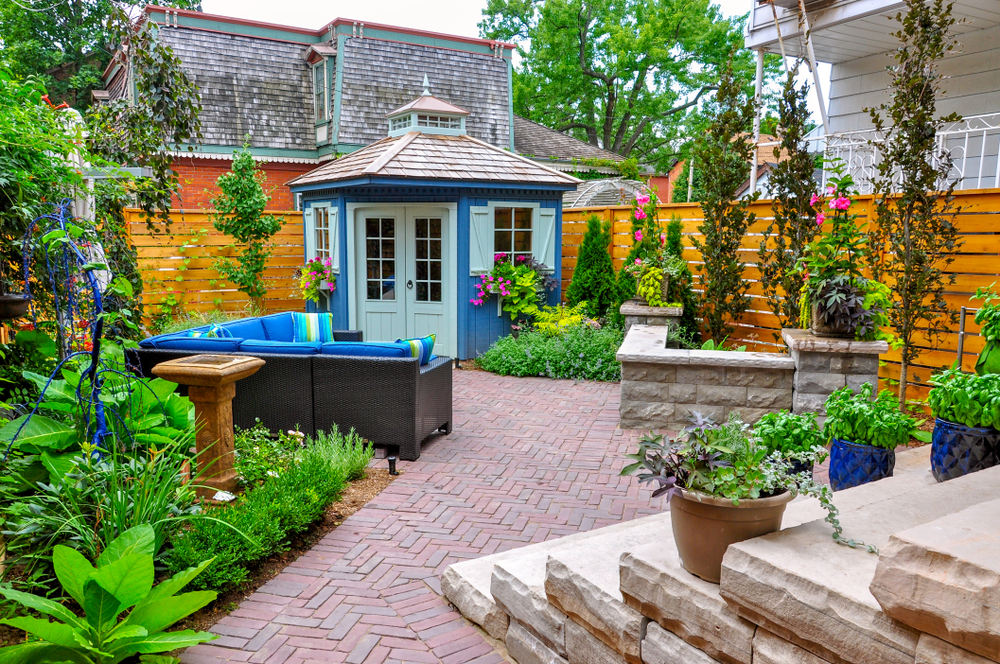
Things To Consider Before Going for A Hardscape Revamp
When revamping your hardscape, it’s essential to consider certain factors before diving in. Here are some things you should take into account when thinking about a revamp:
Cost: How much are you willing to invest in the project? Make sure that the cost is within your budget and that all materials used are high quality.
Time: Depending on the project’s scope, it could take some time to finish. Make sure to plan enough time for your revamp and be flexible if it takes longer than you expect.
Maintenance: Different materials require different levels of maintenance. Do your research and find out which material is suitable for your space and how often it needs to be cleaned or replaced.
Style: Whether you want a classic, modern, or eclectic look, make sure that the revamp reflects your style and tastes.
How Much Does a Hardscape Revamp Cost?
The cost of a hardscape revamp depends on the size and complexity of the project. Smaller asphalt areas need less asphalt but may require more labor.
On the other hand, larger asphalt areas require more asphalt but can be done in shorter periods. The cost also includes preparation of the site before asphalt is laid out and repairs that need to be done.
On average, asphalt paving can cost from $5 to $7 per square foot, depending on the size and complexity of the project.
Things To Do Before Approaching Your Hardscaping Project
Before you approach your asphalt paving contractor, there are several things that you should consider. First, ensure your asphalt area is free of debris.
Second, check the surface for cracks and make sure they are sealed. Finally, inspect the drainage system to ensure that it is functioning correctly. These steps will help ensure that your asphalt surface remains safe and attractive.
Here’s a guide to help you with hardscape designing.
Why Choose an Asphalt Paving Contractor for Hardscape Maintenance?
An asphalt paving contractor can provide a wide range of services, including asphalt repair and installation, resurfacing, patching, overlaying, and more. Hiring an asphalt paving specialist offers plenty of benefits instead of trying to do the job yourself.
First and foremost, asphalt paving contractors have the necessary experience and expertise to do the job correctly. They know how to properly install asphalt and specialized equipment such as asphalt pavers, spreaders, asphalt tampers, and rollers. It ensures that your hardscape will be installed correctly and last for years.
Hiring an asphalt paving contractor also eliminates the need for expensive tools and materials you would otherwise need to purchase if you attempted a DIY project. Asphalt pavers cost thousands of dollars alone! Furthermore, they can quickly complete projects with their field knowledge and experience.
Finally, working with an asphalt paving contractor guarantees quality results. They pay attention to minor details and proactively address any issues. They also have access to various asphalt mixes tailored to suit your needs. They will ensure your hardscape is installed correctly.
Overall, contractors offer experience and quality results when revamping your hardscape this summer. They are the best choice for ensuring that your hardscape is adequately maintained. With their knowledge, you will get peace of mind when completing a hardscape revamp this summer.
Purcell’s Paving & Masonry offers a vast range of asphalt services and drainage work in Hillsborough, NJ. Request a free estimate today to get started with your project!
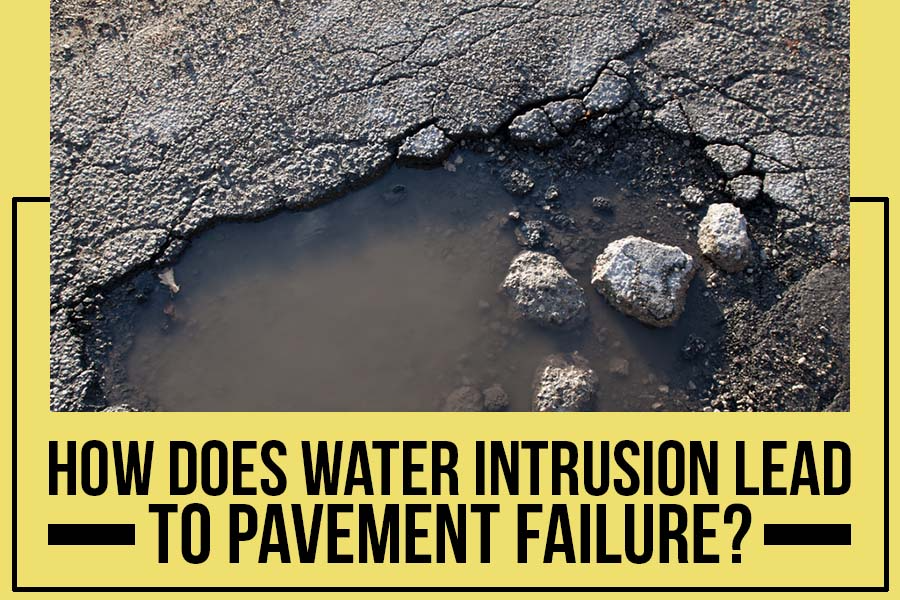
Key Takeaways:
- Poor soil, lack of maintenance, improper installation, and excessive traffic loads are all common causes of premature pavement failure.
- To prevent pavement damage due to poor soil, install drains that will help keep the area dry.
- Proper pavement maintenance can go a long way in prolonging its life span. Typically, proper upkeep will add between two to three years before it demands repairs or replacements.
- Keeping a close watch on finished projects is essential to detect any cracks or changes. By identifying structural fractures early on, you can find the root of the issue and devise an effective remedy.
Do you ever wonder how your car can take such a beating from driving on the same roads year after year? We hardly give it any thought – we trust that our roads and pavements are reliable, strong, and built to last. But what if they weren’t? What if water intrusion impacted their stability in ways that we often overlook and don’t even realize?
When it comes to the way pavements are built and maintained, it’s essential to consider how water intrusion holds the potential to affect performance. Water intrusion into pavement can occur through various mechanisms that lead to multiple issues, many of which directly conflict with current and long-term pavement viability. As such, understanding the effects caused by water intrusion on pavement failure should be fully understood for maintenance strategies to avoid problems before they become an issue.
In this blog post, Purcell’s Paving and Masonry pavement experts will discuss how water intrusion affects roadway performance. We will also cover what methods can be employed to prevent failures due to water damage.
So, if you’re interested in learning more about why water intrusions matter when assessing pavement conditions and discussing necessary repairs or upgrades, keep reading!
What Causes Water Intrusion?
Water intrusion can cause various issues, including cracking, potholes, and even complete pavement failure. Following are some factors that can result in water intrusion in the pavement.
1. Poor Drainage
It is essential to ensure water flows away from the pavement’s surface. If there is poor drainage, water can accumulate on the pavement’s surface, causing it to weaken and eventually fail. It can be prevented by ensuring that drainage systems are in place and functioning properly.
2. Poor Compaction
When pavement is being installed, it must be compacted properly. If the pavement is not compacted properly, it can become porous, allowing water to seep into the surface and cause damage. To prevent this, it is essential to ensure that proper compaction equipment is used and that the pavement is compacted to the correct density.
3. Improper Jointing
Joints are used in the pavement to allow for movement and expansion of the surface. If these joints are not properly sealed, water can seep into the pavement and cause damage. To prevent this, it is vital to ensure that joints are properly sealed with a high-quality sealant.
4. Presence of Cracks
Cracks in the pavement can allow water to seep into the surface and cause damage. To prevent this, you need to ensure that cracks are properly sealed and that regular maintenance is performed to identify and repair any new cracks that may form.
Also Read: Driveway And Parking Lot Repair: Should You Patch, Resurface Or Replace?
5. Presence of Debris
Debris on the pavement, such as leaves and twigs, can block drainage systems and cause water to accumulate on the surface. To prevent this, it is essential to ensure that drainage systems are clear of debris and that regular cleaning is performed to remove any debris that may accumulate on the surface.
6. Use of Improper Materials
If the wrong materials are used in pavement construction, they can become porous, and water seeps into the surface. To prevent this, it is crucial to ensure that the right materials are used and installed according to the manufacturer’s specifications.
How Water Intrusion Affects Pavement?
Water intrusion in the pavement is a serious issue that can cause many problems for both property owners and the general public. When water infiltrates the pavement, it can cause the surface to weaken, crack, and even fail. It can result in costly repairs and even pose a safety hazard to those who use the pavement.
Deterioration of Pavement
When water is allowed to enter the pavement, it can cause the pavement material to break down and become weaker over time. It can lead to pavement failure as the pavement cannot bear any loads placed on it.
Formation of Potholes
Water intrusion into pavement can also cause potholes and other surface irregularities. Potholes are especially dangerous for pedestrians and vehicles, as they can create hazardous driving conditions.
Damage From Freezing/Thawing Cycles
In freezing climates, water that has entered the pavement may freeze and expand, which causes further damage to the pavement material leading to pavement damage. Conversely, thawing cycles in warmer climates can also cause damage due to water intrusion as the pavement weakens.
Subgrade Erosion
When pavement is exposed to repeated cycles of freezing and thawing, the pavement’s subgrade can also become eroded, leading to asphalt pavement failure.
Corrosion of Underlying Layers
Corrosion of underlying pavement layers caused by water infiltration can lead to pavement damage over time.
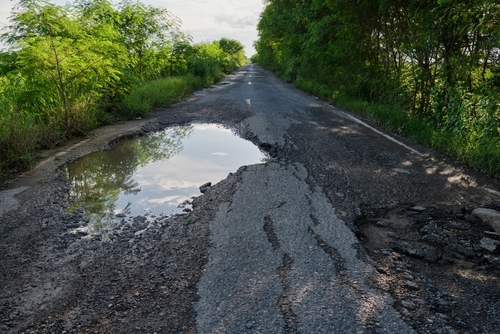
Preventing Water Intrusion Effects on Pavement
It is possible to prevent pavement failure related to water intrusion. Asphalt pavement can be protected with a combination of seal coating and crack filling. The approach helps protect the pavement from the effects of water infiltration by sealing out moisture. It also helps prevent cracks from forming or expanding and arrests minor damage before it becomes a more severe problem. Regular pavement maintenance, including seal coating, crack filling, pothole repair, and other asphalt services, can significantly prolong the life of the pavement by helping avoid pavement failure due to water intrusion.
Let Purcell’s Paving and Masonry Help You Out!
At Purcell’s Paving and Masonry, we understand pavement failure and how water intrusion can cause pavement deterioration. Our professional team of pavement maintenance experts will help you avoid asphalt damage through regular pavement maintenance, including seal coating, crack filling, pothole repair, and other asphalt services in Somerville, NJ. We also specialize in proper drainage solutions to avoid pavement failure from water intrusion. Contact us today for a free estimate!
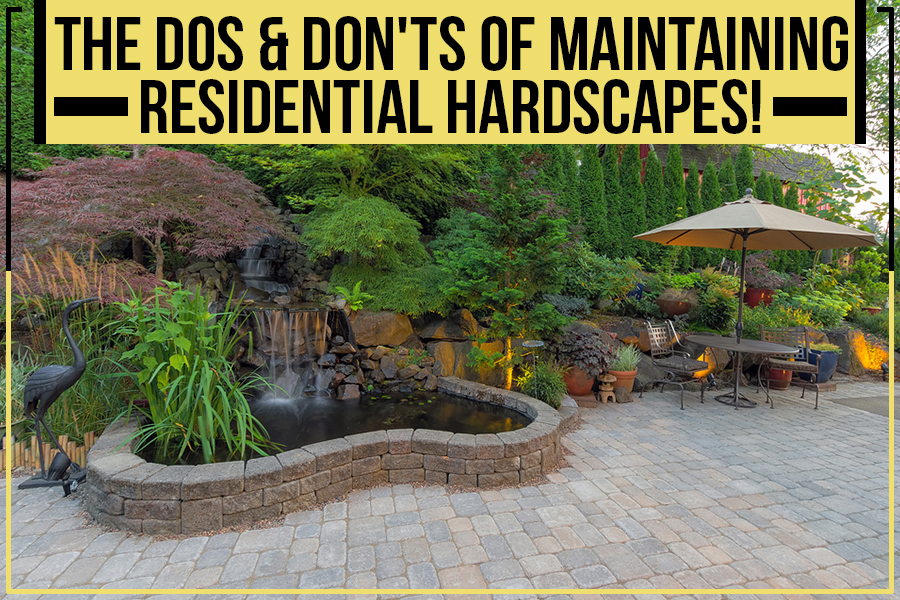
Key Takeaways:
- Hardscaping can enhance your property’s aesthetics and increase its value.
- Regularly inspecting your hardscapes can help you catch any potential issues before they become serious problems.
- Using harsh chemicals and abrasive cleaners can damage the surface of your hardscapes. Instead, use mild soaps and water or a specialized cleaner specifically designed for the type of hardscape material you have.
- Sealing your hardscape can help protect it from the elements and prolong its lifespan. The frequency at which you must reseal will depend on the type of material, so consult a professional hardscaping service such as Purcell’s Paving.
- If you notice any issues with your hardscape, don’t put off repairs because the longer you wait, the worse.
Transform your backyard into a beautiful and functional outdoor living space with hardscaping! It can enhance your property’s aesthetics and increase its value, from patios and driveways to retaining walls and outdoor kitchens. But let’s remember that residential hardscapes need a little TLC to keep them looking sharp, just like a new haircut or a fresh manicure. Purcell’s paving and masonry gives you the rundown on keeping your hardscapes in tip-top shape with our handy dos and don’ts guide.
Do: Regularly Inspect Your Hardscapes
Periodically inspecting your residential hardscapes can help you catch any potential issues before they become serious problems. Look for cracks, uneven surfaces, and other signs of damage. If you notice any problems, addressing them immediately is essential to avoid further damage and costly repairs.
Don’t: Use Abrasive Cleaners on Your Hardscapes
It’s important to keep your hardscapes clean, but using harsh chemicals and abrasive cleaners can damage the surface of your hardscapes. Instead, use mild soaps and water or a specialized cleaner specifically designed for the type of hardscape material you have.
Do: Seal Your Hardscapes
Sealing your hardscapes can help protect them from the elements and prolong their lifespan. The frequency you require to reseal will depend on the material type, so consult with a professional hardscaping service such as Purcell’s Paving.
Don’t: Put Off Repairs
If you notice any issues with your residential hardscapes, don’t put off repairs. The longer you wait, the worse the damage can become, ultimately costing you more in the long run. A professional hardscaping service such as Purcell’s Paving can help you assess the damage and devise a plan to repair it.
Do: Regularly Clean Your Hardscapes
Regularly cleaning your hardscape can keep it looking its best and also help prevent damage from dirt, debris, and other accumulations.
Do: Check for Pest Infestations
Inspect your residential hardscapes regularly for any signs of pest infestations, such as holes in brick or concrete. Insects and other pests can cause significant damage to hardscaping if left unchecked. Let a professional hardscaping service uncover your problem and provide remedies to avoid future damage.
Don’t: Use Pressure Washers to Clean Hardscapes
Pressure washers can be effective when used correctly. Still, they can also cause significant damage to hardscaping if not used correctly. The high pressure from a pressure washer could quickly erode the surface of your residential hardscape, resulting in costly repairs and replacements. It’s important to avoid using a pressure washer for cleaning your hardscaping and instead opt for gentler methods such as scrubbing with soap and water or hiring a professional service.
How To Lower Hardscaping Maintenance Cost
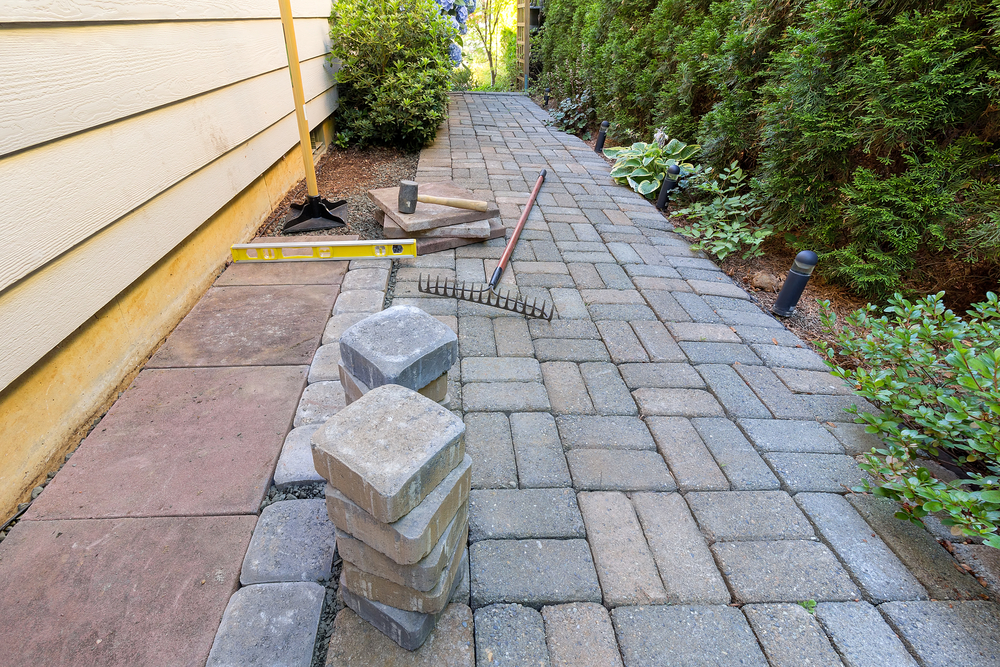
- Use high-quality materials: Investing in durable and long-lasting materials will mean you won’t need to repair or replace them frequently due to weather damage.
- Hire professionals: Professional services can be more cost-efficient than trying to do it yourself, especially if you’re not experienced in the field.
- Regular cleaning: Regularly cleaning your hardscaping is essential for maintaining its beauty and preventing the buildup of dirt and debris.
- Regular maintenance: Scheduling regular maintenance for your hardscaping ensures everything stays in top shape and looks great.
- Invest in good drainage: good drainage can help prevent water from pooling up around your hardscape, which can lead to damage over time.
- Sealant: Applying sealants can help protect your hardscaping from weather damage and increase its lifespan.
- Landscaping: Adding plants or landscaping around your hardscaping will make it look more attractive and provide additional protection against flooding, erosion, and other problems.
- Protect from traffic: Take steps to reduce traffic on your hardscape — such as installing pavers instead of concrete — to minimize wear and tear.
- Lighting: Installing outdoor lighting can add safety and aesthetic appeal to your hardscaping. Consider adding solar lights or other energy-efficient options to save money on electricity bills.
You don’t need to break the bank for hardscaping maintenance. Here are some tips on how you can lower your costs:
Also read Interlocking Paver Patios: A Concise Guide To Adding Style And Value To Your Home.
Hardscaping Benefits for Your Residential Property
Hardscaping can provide a variety of benefits to a residential property. Here are a few examples:
1. Increased Curb Appeal:
Hardscaping elements such as driveways, walkways, and patios can significantly enhance a property’s aesthetic, making it more visually appealing to potential buyers.
2. Increased Property Value:
Investing in hardscaping can increase the overall value of a property, making it more valuable in the real estate market.
3. Outdoor Living Space:
Residential hardscaping allows homeowners to create functional outdoor living spaces such as patios, decks, and outdoor kitchens, extending the living space of a property and providing more opportunities for entertaining and relaxation.
4. Water Management:
Hardscaping can also be used to manage water on a property, with elements such as retaining walls and drainage systems helping to prevent water damage and erosion.
5. Low Maintenance:
Many residential hardscaping materials require very little maintenance, saving homeowners time and money in the long run.
6. Increase Property Security:
Hardscaping can also create boundaries and entry points with gates or walls to increase property security.
7. Climate-Resistance:
Hardscaping elements like patios, walkways, driveways, etc., made of concrete, stone, pavers, etc., can withstand harsh weather conditions and provide a durable surface.
8. Flexibility:
Hardscaping can be customized to fit a homeowner’s specific needs and preferences, allowing for a wide range of creative possibilities.
Here’s How We Can Help
Let Purcell’s Paving and Masonry assist you in creating a gorgeous, functional space that fits your budget and lifestyle. Our experienced team of professionals in Warren, NJ, is the best in residential hardscaping services, so whatever project you have envisioned – we can bring it to life! Trust us with our years of expertise for all your hardscape needs.
Transform your outdoor area into something unique with our wide selection of patio, walkway, fire pit, and water feature options. Our team of specialists can assist you in selecting the perfect design and materials that will bring your dream to life! With us, you’ll have everything necessary for an excellent outdoor living space experience. Get your free estimate from here.
14 Drainage Problems – Why Maintenance Matters?
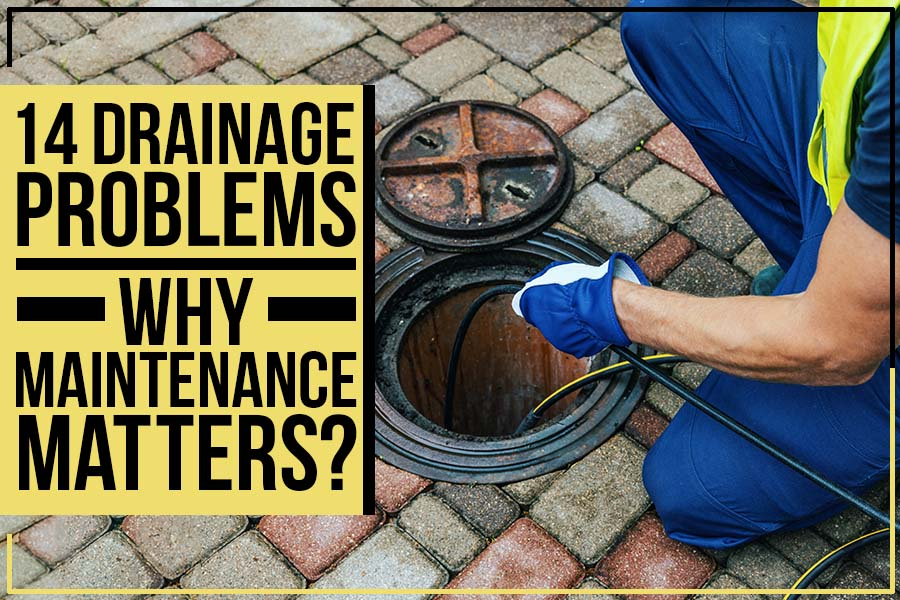
Key Takeaways:
- Seasonal drainage issues can arise from flooding, saturation, and erosion due to rainwater overflowing.
- Maintenance can save money by preventing clogs and leaks that cost you thousands of dollars in repairs.
- Sub drains can become blocked with debris or be damaged due to tree roots and other environmental factors.
- If the ground is not leveled, water will naturally flow downhill, leading to pooling and standing water.
- It’s also essential to maintain your drainage systems regularly to prevent drainage problems from occurring.
Dealing with drainage issues can be a major headache for property owners. A poorly-maintained drainage system leads to clogged pipes and problems ranging from minor annoyances to severe damage.
Not only can this cause troubles in the present day, but if left unchecked, it could lead to substantial repair bills. Whether you’re dealing with an existing problem or want to ensure your current setup remains in good condition, proper maintenance is critical for drainage systems.
This is why you need to contact an asphalt paving contractor who can do drainage maintenance to free you from potential issues. To help you understand better, let’s discuss why maintenance matters for homeowners and the available recovery options.
Drainage Problems Homeowners Need to Look Out For
1. Seasonal Drainage Issues
These issues can arise from flooding, saturation, and erosion due to rainwater overflowing. Homeowners must be careful as this can quickly lead to structural damage and expensive repairs. Other issues, such as clogged gutters and underground piping blocked by tree roots or debris, can cause many homeowners problems.
2. Drainage Maintenance-Related Issues
Suppose your home runs on a traditional drainage system. In that case, it is essential to maintain the system efficiently. Proper maintenance can help you save money by preventing clogs and leaks that can damage your property and cost you thousands of dollars in repairs.
3. Design Related Issues
The design of your drainage system is also essential. Poorly designed systems can lead to flooding, drainage problems, and an increased risk of basement seepage. This issue can be addressed by hiring an asphalt paving contractor for proper installation and maintenance services.
4. Snow Wall Mismanagement
Snow walls can create drainage issues during the winter, as snow and ice build up in front of them, blocking the free flow of water. With the necessary maintenance services, you can ensure that the snow walls work correctly to help divert water away from your property.
5. Sheet Ice
Sheet ice is a common problem in areas that experience frigid temperatures. This type of ice can accumulate on asphalt surfaces, blocking water flow and causing drainage problems. An asphalt paving contractor can use specialized tools to remove the sheet ice and ensure proper drainage.
6. Gutter Blockages
Gutters are essential to any drainage system as they help divert rainwater away from your home’s foundation. However, if there is a blockage in the drains, it can lead to flooding and other drainage issues.
7. Spring Thaw Weakening
Asphalt pavement can become weak due to water accumulation when ice and snow start to thaw during the spring months. This weakening can cause drainage problems.
8. Issues With Sub Drains
Sub drains can become blocked with debris or be damaged due to tree roots and other environmental factors. A professional drainage repair contractor can inspect the sub drains and surrounding areas to see if any potential issues need to be addressed.
9. Lack Of Maintenance for Outlet Ditches
Outlet ditches are critical components in a drainage system. Suppose the ditches become blocked due to debris or sediment build-up. In that case, it can cause water to accumulate and lead to drainage problems.
10. Issues With Culverts
Culverts are designed to allow water to flow under roads and other areas safely. If the culvert becomes blocked due to debris or sediment build-up, it can lead to drainage problems.
11. Runoff Maintenance
Runoff typically consists of rainwater, snowmelt, and other liquid runoff that accumulates near roads and parking lots. This water can lead to drainage issues if it is not managed correctly.
12. Issues With Verges
The Verges are the strip of land between a road and sidewalk or property line. These can become clogged with debris and cause drainage problems if not maintained adequately.
13. Drainage Issues Related to Topography
Topography can play a role in drainage problems. Suppose the ground is not level or has an incline. In that case, water will naturally flow downhill, leading to pooling and standing water.
14. Low Lying Ground
This can also be an issue, as water can become trapped and lead to flooding. Low-lying areas should be properly graded to ensure water is not a problem.
Benefits Of Getting Your Drainage Issues Fixed on Time
Saves Money
Proper drainage maintenance can help save money because it prevents significant repairs that may be required due to neglected drainage issues.
Prevents Property Damage
Drainage problems can cause severe water damage to buildings, foundations, and asphalt pavements. Having a professional contractor inspect your drainage system can identify potential issues before they become more serious.
Longer-Lasting Asphalt Pavement
Regularly maintaining the drainage system helps ensure that asphalt pavement last longer by preventing water pooling in areas where asphalt overlaps other materials.
Factors To Consider Before Using Drainage Solutions
Budget
If your contractor recommends a drainage solution, it’s essential to ask about the cost of materials and labor.
Climate
Depending on where you live, specific drainage solutions may be more suitable than others. Ask your asphalt paving contractor for advice on the best type of drainage system based on local climate conditions.
Site Preparation
It’s essential to ensure that the site is adequately prepared for drainage work. Ask your asphalt paving contractor about their processes for correcting issues before installation begins.
Here’s what you need to know about drainage systems for parking lots.
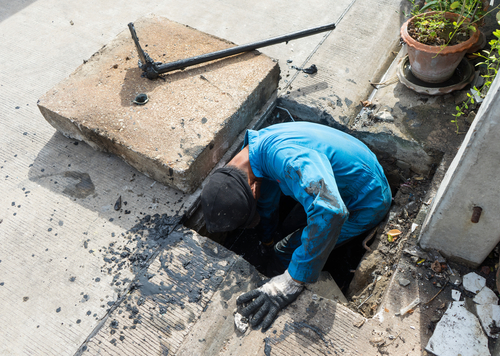
Reasons To Hire a Professional Asphalt Paving Contractor.
Cost Saving
Hiring a professional contractor to maintain and repair drainage systems can save money in the long run. Professionals have specialized tools and experience that allow them to identify and solve drainage problems quickly and efficiently.
Safety
Professionals have the proper safety equipment to handle hazardous materials such as heavy machinery and chemicals used in asphalt maintenance.
Quality Of Services
Professionals are experienced and knowledgeable in asphalt maintenance, so they can provide quality work that will help your asphalt last longer.
Warranties
Most contractors offer warranties on their services, which can provide peace of mind and assurance that any drainage maintenance or repair will be done correctly.
Expertise
Professional contractors have the expertise to identify potential problems with asphalt before they become significant issues. They know asphalt specifications and can recommend specific solutions for drainage issues.
Equipment
Professional asphalt paving contractors have access to specialized equipment designed for asphalt maintenance and repair. This ensures the job is done correctly and quickly, so you can get back to your day-to-day activities without worrying about drainage issues.
Dealing with drainage issues can be difficult, but with the help of contractors, you can take care of your drainage problems quickly and efficiently. It’s also essential to maintain your drainage systems regularly, as this will help to prevent drainage problems from occurring later on.
Purcell’s Paving & Masonry offers a vast range of asphalt services and drainage work in Branchburg, NJ. Request a free estimate today to get started with your project!
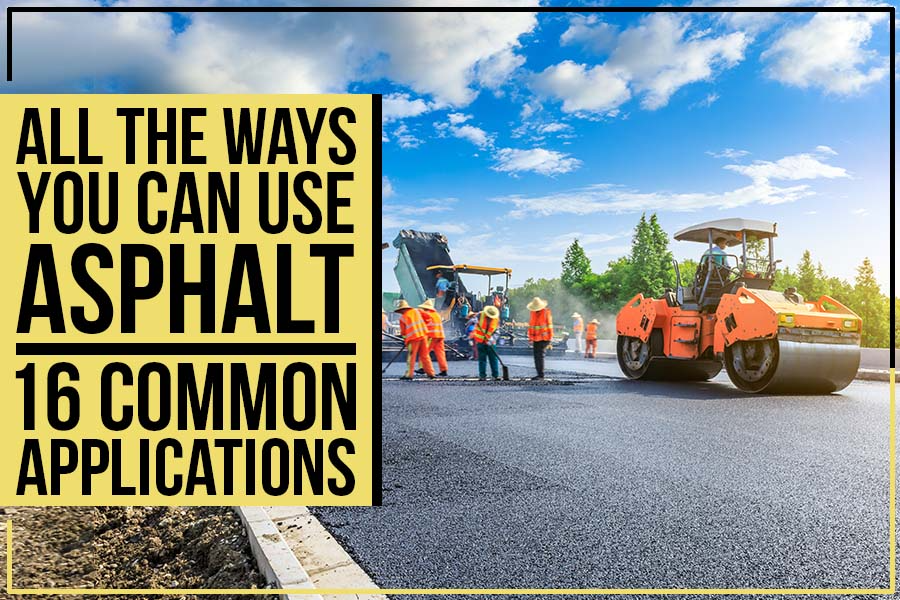
Key Takeaways:
- Asphalt is a versatile material used for construction, repair, and maintenance tasks.
- It is highly durable and cost-effective, making it an excellent choice for roads and parking lots.
- Asphalt is also ideal for recreational surfaces such as basketball courts or tennis courts due to its superior traction properties and cushioning.
- It is an excellent choice for any project requiring a durable, reliable surface that can withstand heavy use and weather extremes.
- Purcell’s Paving and Masonry offer asphalt paving and maintenance services to customers in Bridgewater, NJ, and the surrounding areas.
Asphalt is an incredibly versatile material used in various applications, from construction and repair projects to recreation and landscaping. Asphalt is durable, cost-effective, and easy to use. Purcell’s Paving and Masonry will discuss how you can use asphalt in your projects.
Various Asphalt Applications
1. Paving
Asphalt is most commonly used for paving roads, driveways, and parking lots. It is also used for constructing roofs, gutters, and downspouts. Asphalt is a durable material that can withstand heavy traffic and weather extremes.
2. Roads and Driveways
Asphalt is the go-to material for paving roads and driveways, thanks to its durability, affordability, and easy installation. Asphalt mixtures are also incredibly resistant to water, oil, and chemical damage, making them ideal for long-lasting road surfaces that can withstand heavy traffic. Asphalt driveways offer improved traction in wet weather conditions and a firm surface that won’t crack or crumble with age.
3. Parking Lots
Asphalt is also commonly used to create parking spaces. It’s an excellent choice due to its ability to withstand harsh weather conditions and daily wear-and-tear from vehicles coming in and out of parking lots throughout the day. Plus, unlike concrete or gravel, asphalt can easily be repaired with minimal disruption in case of any cracks or damage from heavy vehicle use.
4. Roofing Protection
Asphalt isn’t limited to paving roads; it’s also used in roofing protection! Asphalt shingles protect your roof from moisture and provide insulation against extreme temperatures while still being lightweight enough not to strain your roof decking structures. Additionally, asphalt shingles come in various designs and colors so that you can choose the perfect option for your home or building’s aesthetic appeal!
5. Flashing
Asphalt is used to construct flashing to seal around openings in roofs and walls. Flashing is available in various widths and thicknesses to suit different applications.
6. Siding
Asphalt is also used as a siding material, particularly in commercial applications. Asphalt siding is durable and low maintenance, making it an ideal choice for businesses. Asphalt siding is available in various colors and styles to suit different aesthetics.
7. Insulation
Asphalt felt is commonly used as an underlayment for roofing systems, as it helps to prevent heat loss and condensation. Asphalt felt also insulates walls and floors in residential and commercial applications.
8. Pipe Coating
Asphalt coating on pipes helps prevent corrosion and leaks. Pipe coating is typically applied to metal pipes but can also be applied to concrete and plastic pipes. Pipe coating is available in a variety of thicknesses to suit different applications.
9. Soundproofing
Asphalt sheeting is used to line walls and ceilings to reduce noise levels. Asphalt sheeting is available in a variety of thicknesses to suit different needs.
10. Sports Surfaces
If you’re looking for a sports court surface that will last through various weather conditions without cracking or crumbling over time, then asphalt is a perfect choice! Its natural grip helps basketball or tennis players maintain their footing and provides shock absorption, which reduces fatigue during long games or practices. In addition, it’s easy to install, maintain and repair – making it an ideal option for sports fields!
Asphalt is often used when repairing roads damaged due to wear and tear or extreme weather conditions. It is because asphalt can be quickly applied over existing surfaces, requiring minimal prep work. Its durability ensures that your roads remain in good shape for years with proper maintenance.
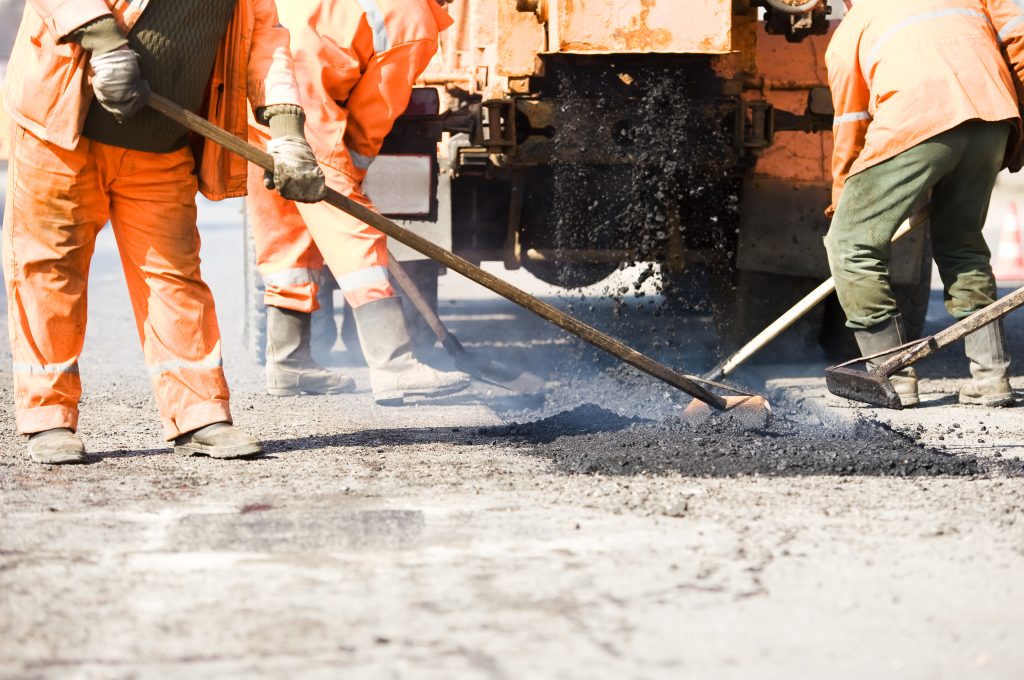
11. Asphalt For Recreation & Landscaping Projects
Asphalt isn’t just useful for construction and repair projects; it can also be used for recreation purposes. For example, if you’re building a basketball or tennis court in your backyard, then asphalt is one of the best surfaces you can choose due to its superior traction properties. Asphalt courts are also easier on the joints than concrete surfaces since they provide more cushioning when players land after jumping.
In addition to recreational purposes, asphalt can also be used for landscaping projects such as walkways, patios, and driveways. Asphalt has a sleek look that complements any outdoor space while still being extremely durable against foot traffic and inclement weather conditions like heavy rain or snowfall. Plus, it’s relatively low-maintenance compared to other materials like wood or stone, which require regular sealing or staining processes to maintain their appearance over time.
12. Asphalt Resurfacing
Asphalt resurfacing is installing a new layer of asphalt over an existing one. It can be done to repair damage to the existing asphalt or to extend its lifespan. Resurfacing is typically done by milling the existing surface and installing a new layer of asphalt. The new coating is then compacted with a roller.
Also, read our blog on the difference between asphalt repairs and resurfacing.
13. Asphalt Milling
Asphalt milling removes the top layer of asphalt from a road or parking lot. It is done to repair damage to the asphalt or to prepare it for resurfacing. Milling is typically done with a large machine that grinds up the asphalt into small pieces.
14. Asphalt Overlay
An asphalt overlay is a thin layer of new asphalt installed over an existing surface. It can be done to repair damage to the existing surface or to extend its lifespan. Overlays are typically less than 2 inches thick and are installed by spreading and compacting the new asphalt with a roller.
15. Paving Asphalt Repair
Asphalt repair is any work done to fix damage to an asphalt surface. It can include patching, resurfacing, milling, or any other kind of repair work. Trained professionals typically do asphalt repairs with experience with the specific repair type.
16. Cold Mix Asphalt
Cold mix asphalt is an asphalt mix that does not require heating before it can be installed. Cold mix asphalt can be made from virgin or recycled pavement. Cold mix asphalt is typically used for patching or repairing existing pavements.
Click here to view more asphalt applications.
Need Paving Services in Bridgewater, NJ?
Purcell’s Paving and Masonry in Bridgewater, NJ, offers a wide range of services at competitive prices, and our skilled team has the experience and expertise to get the job done right. Contact us today to get a free estimate for your next project.
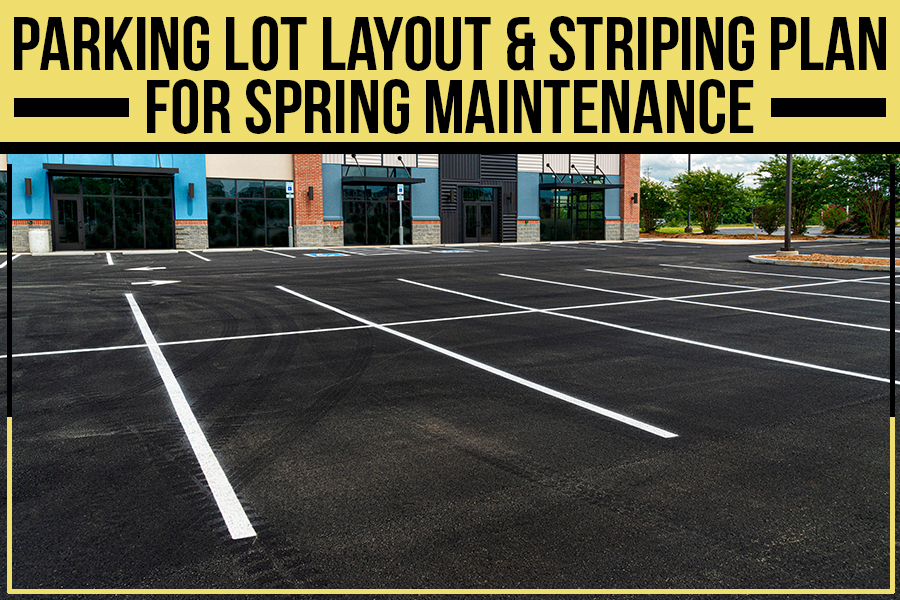
Key Takeaways:
- You should check your commercial parking lot for drainage, signage, curbing, lighting, gravel and debris, pavement markings, and ADA compliance.
- You will need professional-grade supplies to stripe your parking lot correctly.
- Before you begin striping, check if any changes have recently been made in ADA regulations.
- Choose a color scheme that is easy for drivers to see while still visually appealing.
- Determine the layout of the parking lot by considering how much space is available and how many cars need to fit comfortably on site.
Every season brings its own maintenance needs, and spring is no different! Maintenance during this season helps prevent expensive repairs down the road and keeps your premises looking clean and inviting all year round.
But your property interior isn’t the only place that needs maintenance; you should also consider its exterior, i.e., your parking lot. Contrary to popular belief, your commercial parking lot significantly affects whether customers frequent your establishment. A well-maintained and functional parking lot will attract customers, while its issues can deter them. As the winter ends, you may notice that your commercial lots are starting to show wear and tear. Thus, it is essential to go through a maintenance routine to improve their functionality. Purcell’s paving and masonry go through the ways to assess and enhance parking lot layout and striping to get them ready for the warmer months ahead.
Assessing Commercial Parking Lot Layout
When assessing the layout of your commercial parking lot, there are a few points to keep in mind:
1. Check Drainage
Winter can cause issues with drainage, as standing water and puddles can develop. It tarnishes the property’s appearance and can become a safety hazard. Pools can result in slip-and-fall accidents you don’t want near your property. Ensure that your drainage system works and that no water is in your parking lot.
2. Inspect Signage
Parking lot signage should be up-to-date and in compliance with local regulations. Please ensure all signs are visible and the information on them is accurate and relevant to your property.
3. Check Curbing
Any curbing added to the parking lot over the winter needs to be assessed for its effectiveness in keeping water out of the parking lot. Identify any cracks or deterioration, as this could mean that it’s necessary to replace sections of the curbing.
4. Assess Lighting
Lighting plays a crucial role in safety, so ensure all lighting fixtures are working correctly and pointing toward where they need to be pointing (e.g., away from buildings). It is crucial to protect visitors and vehicles in your parking lot.
5. Check for Gravel & Debris
Winter can cause debris to accumulate in the parking lot, so it’s essential to ensure all gravel and debris are swept up before the start of the new season. It can help prevent accidents caused by loose material on the parking lot’s surface.
6. Assess Pavement Markings
Pavement markings are essential to any parking lot, providing clear directions for drivers and pedestrians. The pavement markings must be assessed for visibility, accuracy, and legibility. If any markings have been damaged or faded over winter, then it is time to make sure they are replaced or repainted. It’s also important to check that any arrows or directional signs point the right way.
7. Check ADA Compliance
Americans with Disabilities Act (ADA) compliance is a must in parking lot maintenance, and it’s essential to check that your parking area adheres to the required standards. It includes marked spaces for wheelchairs and ensuring that walkways are wide enough and do not have any obstacles or steep inclines.
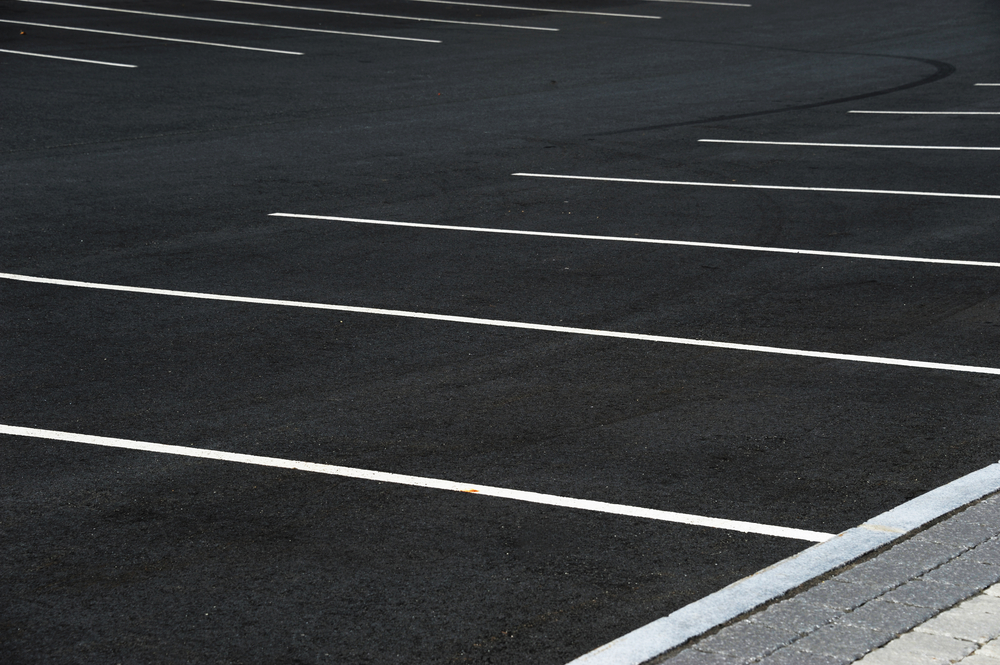
Assessing Commercial Parking Lot Striping
After considering the layout, here’s how to assess and maintain commercial parking lot striping:
1. Get the Right Supplies to Stripe Your Lot
When striping a parking lot, you’ll need quality supplies such as paint and stencils for creating markings. Using professional-grade products is essential, as inferior materials can lead to premature fading or wear and tear due to weather conditions.
It’s best to contact a professional contractor to deal with striping as they have all the necessary tools and expertise to handle such a task.
2. Assess the Current State of Your Lot’s Striping
Before you begin, you should assess how much work needs to be done on your lot in terms of its striping. Evaluate the current condition of your lot’s curbing, signs, and other existing markings. They may need to be repainted or refreshed with new designs if required.
3. Check for ADA Regulation Changes
In addition to assessing the current state of your lot’s striping, it is essential to check if any changes have recently been made regarding ADA regulations. The Americans with Disabilities Act (ADA) regulates accessibility and compliance standards for public areas like parking lots. Ensure you are up-to-date on all new ADA compliance regulations, as they can affect how you lay out your parking lot.
4. Choose a Color Scheme
When it comes to striping, there are several color options you can choose from. Take into account your company’s branding and the visibility of the parking lot markings. Choose colors that make it easy for drivers to spot their lines while still being visually appealing to customers.
5. Determine the Layout
Consider how much space is available when determining an appropriate layout for a parking lot’s lines and patterns. It includes assessing what kind of parking spots need to be included in the area – marking out accessible parking spaces, loading zones, spaces for electric vehicles, etc. Consider how many cars need to fit comfortably on the site and use this as a foundation for your parking lot design.
6. Apply the Striping and Markings
The striping of a parking lot is applied to areas already paved and ready for use. Before applying the striping, it’s essential to ensure the surfaces are dry and free of debris or dust. You should hire a professional contractor to apply any paint or thermoplastic markings as they adhere to industry standards and have experience in this field.
Related: How Parking Lot Curbing And Gutters Save The Day For Your Property
Conclusion
Parking lot layout and striping are essential for keeping your property safe and operational. It should be checked regularly to ensure all the markings are still visible, lines are straight, and there’s enough room for cars to park safely. Additionally, working with a professional contractor with experience in applying paint or thermoplastic markings can help guarantee that the job is done according to industry standards. These steps will contribute to a well-maintained parking lot any time of year!
Let The Pros Deal with Improving your Commercial Parking Lot in Watchung, NJ
Contact the experts at Purcell’s Paving and Masonry to improve your commercial parking lot with layout, striping, or seal coating services in Watchung, NJ. Let our experienced team help keep your pavement looking its best all year round. Contact us today for a free estimate.
10 Signs Your Chimney Is Structurally Unsound

Key Takeaways:
- Chimneys are essential for ventilation and exhaust but can break down easily.
- Repairing a chimney as soon as possible when damage occurs is crucial because it prevents further destruction.
- Some typical signs that your chimney needs repair are: leaks, cracks, corrosion, swaying, stains, etc.
- Spalling is easy to detect – look for bits of masonry around the bottom of your chimney from the outside.
- Pests can enter your home through several methods, but one potential entry point could be your chimney.
Chimneys are an essential part of a home; they provide ventilation for the fireplace and can also be used to remove smoke and heat from the house. But what happens when your home’s chimney shows signs of structural damage? Can it be fixed, or does it need to be replaced? Read this blog by Purcell’s paving and masonry for the answers.
Chimney Repair Is Important
When one part of the chimney breaks down, it can quickly lead to other issues. Take masonry chimneys, for example. If there’s a crack in the crown, it might grow during repeated freeze-thaw cycles. And when the cracks get more significant, more water seeps in and causes leaks. On average, repairing a chimney costs $455, but the price could be as low as $90 or as high as $1,800.
This problem starts small, but as water and freezing temperatures damage your chimney more, the leak worsens and becomes destructive. People often don’t realize they have a problem with their chimneys until it’s too late. Let’s check out 15 easy-to-spot signs that indicate your chimney needs to be repaired immediately.
Signs Your Chimney Is Screaming for Help!
1. Chimney Leaks:
Suppose you notice any moisture or mold forming near your fireplace. In that case, this could signify that your chimney is leaking and repair is due soon.
2. Crumbling Brickwork:
Over time, the mortar between bricks can weaken, leading to crumbling brickwork around your chimney. Suppose you notice any cracked or broken bricks on or near the chimney. In that case, this could indicate a structural issue that you must take care of immediately.
3. Rust And Corrosion:
Chimneys are often exposed to the elements and can become corroded if not properly maintained. If you notice any corrosion on your chimney, this could be a sign that it needs repair.
4. Chimney Sway:
Chimneys can start to sway if not supported properly, leading to further damage over time. Suppose you notice any visible movement or instability in your chimney. In that case, it’s best to have it inspected for repair by a professional immediately.
5. Chimney Flue Issues:
The flue is part of the chimney that carries smoke and gases out of the home. If your flue becomes blocked or cracked over time, this can lead to hazardous gases building up in your home. If you notice a strange smell coming from your chimney, this could indicate that the flue has been compromised and requires repair.
6. Chimney Cracks or Leaks:
Chimneys can become damaged over time due to wear and tear, leading to visible cracks and leaks. Suppose your chimney is showing signs of cracking or leaking. In that case, it’s essential to get it inspected by a chimney professional as soon as possible.
Also Read: Buying or Selling a House? You Need a Detailed Chimney Inspection – Here’s Why
7. Stains On Chimney Exterior:
Discoloration around the base of your chimney may indicate water damage caused by leakage or condensation. If left untreated, this can lead to further structural damage, so if you notice any discoloration, you must consult a chimney repair specialist.
8. Chimney Separating from Wall:
The mortar between bricks can deteriorate over time due to weather exposure, leading to gaps between the brickwork and the wall of your home’s chimney. This can weaken the integrity of your chimney and create safety hazards, so if you notice any separation, call a chimney repair professional.
9. Signs Of Spalling
Spalling is easy to detect – look for bits of masonry around the bottom of your chimney from the outside. If your chimney isn’t waterproof, water can seep into bricks and cause the surface to peel, pop, or flak. Continuing without a fix could result in a devastating collapse.
10. Pests Getting into Your Home
Pests can enter your home through several openings; one potential entry point could be your chimney. If you find that the pests in your home are primarily located in the room with your chimney, they may be entering through cracks or simply from the top without a chimney cap. Pest control is always worth considering, but if you still have issues after calling them, try contacting a local chimney company.
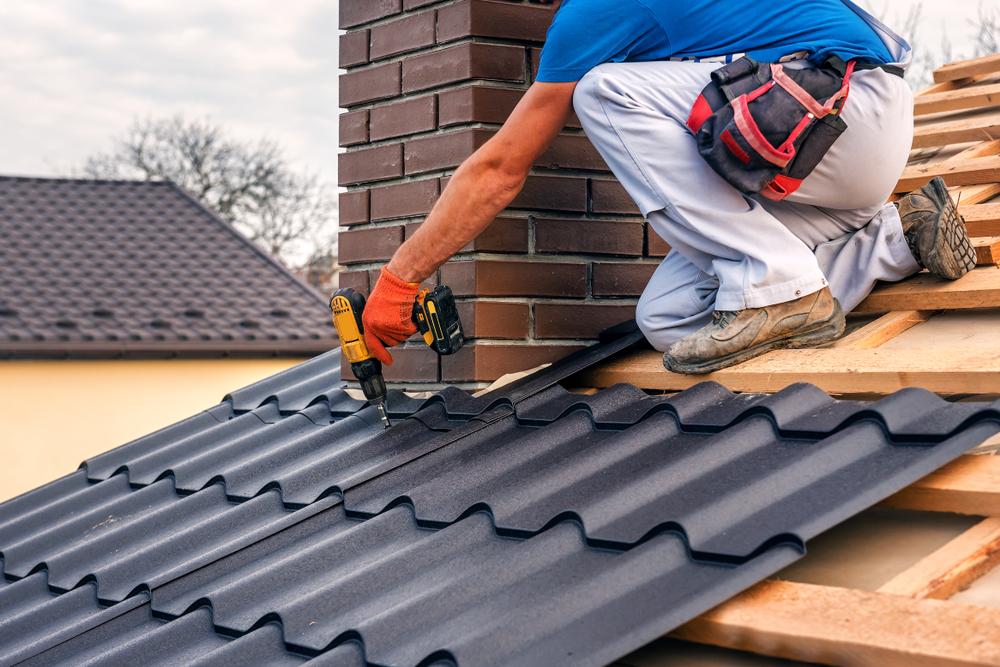
Expert Tips for Chimney Maintenance
Chimneys can be pretty tricky, so here are some tips from the experts on how to stay up-to-date with maintenance:
- Check for cracks in the masonry – look out for crumbling bricks or cracks that may have been caused by wear and tear over time.
- Test the flue – if it’s not working correctly, this could be causing your smoke problems as well as dangerous fumes.
- Clean your chimney regularly – even if you don’t use it often, it’s crucial to get rid of built-up creosote, which can become hazardous when left unattended.
- Don’t forget about the cap – Chimney caps are essential for keeping animals, debris, & water out of your chimney.
- Check the liner – Over time, liners can become corroded or damaged due to repeated heat, moisture, and weather exposure. If you notice any cracks or other damage, it’s time for a repair.
- Make sure everything is sealed correctly – Caulk around the edges of your chimney will help reduce air leakage and keep out pests.
Have You Noticed These Signs? We Can Help!
If your home’s chimney is making strange noises, not working correctly, or otherwise giving you trouble, then it’s time to buzz in the Long Hill, N.J. experts. Our team at Purcell’s paving and masonry will take care of everything – from chimney repair to inspection. We’ll ensure your chimney is up and running like new in no time!
We understand that your family’s safety is important to you. That’s why we guarantee our customers the best possible service and results. We’re confident that we can solve any problem you have, so call us today!
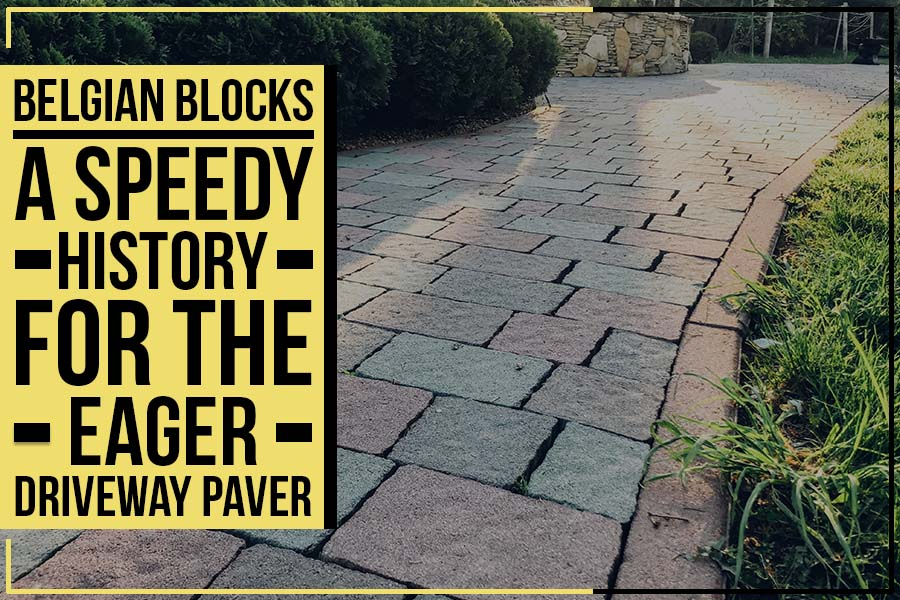
Key Takeaways
- Belgian blocks originated from Belgium and are renowned for providing one of the most aesthetically pleasing driveway installations ever.
- The Romans first used Belgian blocks to prepare roads and sidewalks. The method became increasingly popular with the masses.
- The Belgian blocks have since passed on for generations and gained popularity due to their quick and efficient installation process.
- 5 x 5 x 9 is the standard size. While 4 x 7 x 10 is the jumbo size.
- Purcell’s Paving and Masonry is the right choice if you’re considering using Belgian blocks for driveway installation.
Are you looking to add some personality and pizzazz to your driveway? Consider using Belgian blocks! This old-fashioned paver has made a resurgence in recent years thanks to its combination of speed, durability, and style. In this blog post, we’ll look at the history of Belgian blocks and offer advice on how to use them effectively in your driveway. So read on and get inspired!
Brief History of the Genesis of Belgian Blocks
Belgian blocks—also called sett—have been used to pave roads and sidewalks for centuries. The Romans were the first to employ this method, but it quickly gained popularity due to the speed and efficiency with which horses could travel along paved roads. To this day, engineers continue to construct roads with these blocks.
This stone may have been significant in Belgian history, as suggested by its name. European sailors loaded these massive blocks into the ship’s hold as ballast before setting sail from Belgian port cities like Antwerp.
As merchants loaded their ships with goods, they abandoned the stones in major ports such as Boston and New York, where contractors later used them to pave roadways. There is little to no connection between modern Belgian blocks and Belgium, so the term “Belgian block” has become generic.
Today, Belgian blocks are commonly used for various landscaping purposes, including the construction of walls, borders, and curbs, the paving of streets, the capping of walls, and the construction of pillars. They are also famous for driveways, which can be used as a decorative or sole paving material. Even the most straightforward projects benefit from the eye-catching effect of these stones.
Size and Shape of a Belgian Block
There is no standard size for a Belgian block, and measurements are usually close approximations because each one is unique (to a degree), thanks to the fact that it was hand-cut. The tiniest dimension is about 4 by 4 by 4.
Standard and Jumbo are the two most extensive options.
5 x 5 x 9 is the standard size. While 4 x 7 x 10 is the jumbo size.
You can split these stones with a masonry saw to make them smaller or larger. There are helpful Belgian block calculators or charts available online that you can refer to determine the number of materials required.
The colors of these granite stones are diverse. Colors include pink, black, yellow, and even a gray-and-white mash-up. The blocks have been mistaken for cobblestones by some. Cobblestones, on the other hand, are river rocks that are round and have a dark grey color. Due to the quarrying process, the edges of the Belgian block tend to be rough.
Also, Read – Interlocking Paver Patios a Concise Guide to -Adding Style and Value to Your Home.
Landscaping Projects with Belgian Blocks
1. Belgian Block Edging: Belgian block edging is a great way to add a touch of class to any landscaping project. You can create a clean and polished look by using Belgian blocks to edge your yard’s flower beds, garden paths, or other areas.
2. Belgian Block Driveway: A Belgian block driveway can add curb appeal and value to your home. Considering installing a new driveway, consider using Belgian blocks instead of traditional concrete or asphalt.
3. Belgian Block Curb: The driveway’s shape is clearly defined using Belgian stones as curbing. There is no better, more cost-effective way to liven up a driveway. Simply put, it’s a fantastic method of corralling mulch and other landscaping materials.
4. Belgian Block Border: A Belgian block border is a great way to finish off any landscaping project. By using blocks to create a border around your flower beds, garden paths, or other areas of your yard, you can create a cohesive look that will tie your entire landscape together.
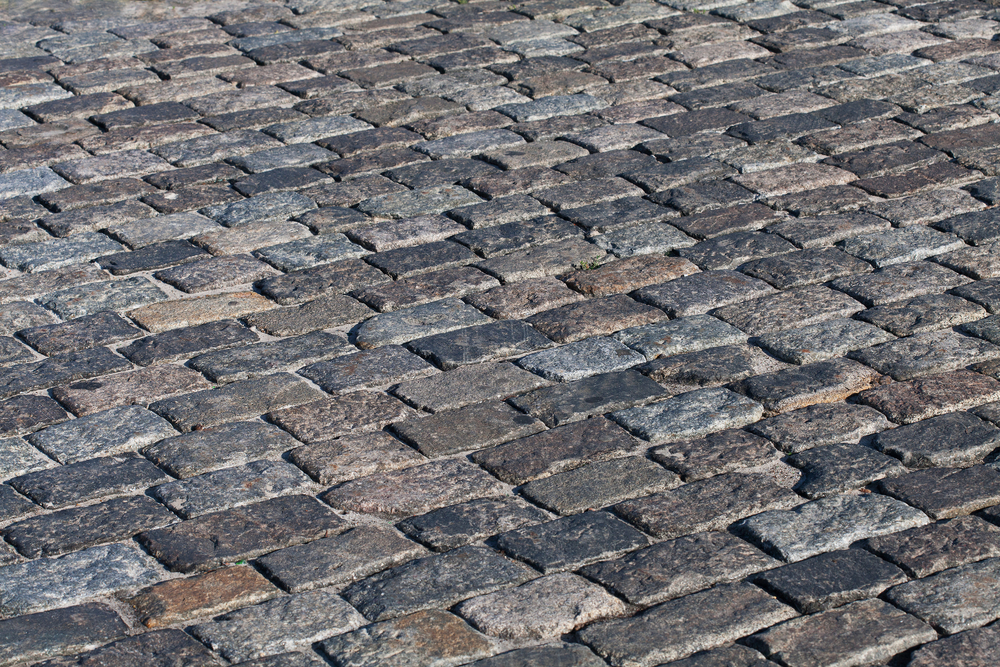
Benefits of Using Belgian Blocks
There are many benefits to using Belgian blocks for your paving projects. First of all, they are very durable. Belgian blocks are made of natural stone so that they can withstand a lot of wear and tear. They are also less likely to crack or chip than other paving materials, like concrete or asphalt.
Belgian blocks are low-maintenance, which is another perk. Once installed, you can do little to keep them looking good. Just sweep them off now and then, and you’re good to go! They also don’t require special sealants or treatments, like other paving materials.
Finally, Belgian blocks can add visual interest to your facility. Their unique shape and texture can help your place stand out. They are the way to go if you’re looking for a way to make a statement with your paving projects!
Why do You Need Professionals for Belgian Block Installation?
Paving and construction are two areas where you should never cut corners. This is especially true when it comes to installing Belgian block driveways. The paving process is detailed and precise; even the slightest deviation can result in an eyesore that lowers your property value.
Be aware of those YouTube videos that make Belgian block installation look like a breeze. The reality is that unless you have extensive experience in the paving and construction industry, you’re better off leaving this job to the professionals.
At best, a DIY Belgian block installation will look amateurish. At worst, it could damage your property and void your insurance policy. So, save yourself the headache and call a qualified paving contractor to handle this job.
If you’re looking to install a new driveway or need any other excavation and construction services in Short Hills, NJ, give Purcell’s Paving and Masonry a call. We’ll be happy to provide you with a free estimate for all your paving needs.


